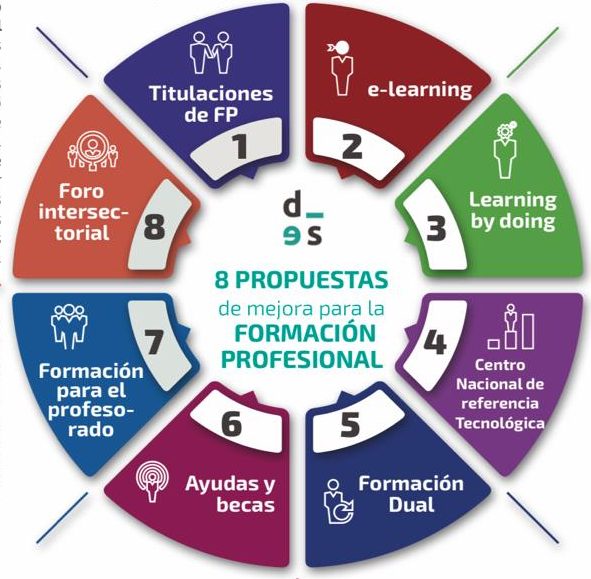30/07/2020
Enrollment in vocational training continues to grow. The most significant increase this year was in this type of education, specifically 50,511 more students than in the previous year, with a 5.9% increase in the intermediate level and a 6.6% increase in the higher level. In addition, a significant part of this growth is due to the increase in the distance learning system, which increased by 7.1% in the intermediate level and 12.6% in the higher level.
How can it be explained thata trainingoption that traditionally did not enjoy widespread social recognition has become such an attractive option for students? Basically, because of a feature that differentiates it from other options: employability.
Some modules included in the Government’s new Vocational Training plan will have 100% employability, and in the case of some focused on the technology sector, salaries well above the average. Thus, a student starting the Big Data module in 2021 will, according to experts, have a guaranteed job and a salary of around 30,000 euros.

The same will happen with other new modules such as Artificial Intelligence or 5G Infrastructures, which provide access to positions for which there is currently more demand than supply. Not surprisingly, there are around 10,000 unfilled positions in the technology sector due to a lack of qualifications. Studying any of these modules guarantees a direct entry into the labor market.
And now vocational training offers these outlets. But it is not the result of chance, but of years of hard work to improve a system that was becoming obsolete and did not meet the real needs of the working world. Thus, at DigitalES we have worked with a method that has led us to identify, analyze, design, propose and respond with solutions to the needs that have arisen with the digital transformation.
Many of them have been included in the new plan presented by the government. Others still have room for improvement and implementation. But together they have made vocational training a tremendously attractive option for students of any age, with quick and effective ways to enter the world of work.
These are the 8 proposals that DigitalES has promoted to improve the educational system and its efficiency.
1.- Revise VET degrees: add new modules, in order to adapt them to the market and to emerging technologies.
2- Develop e-learning: create new content to help consolidate a more digital learning model.
3.- Learning by doing: create a model with a greater number of professional practices in the VET cycles, in order to apply a ‘learn by doing’ model so that future professionals have more capacity to develop their functions.
4.- To create a National Center of Technological and Scientific Reference. Its goal would be to boost STEM careers and the Digital Economy, to become a benchmark for disruptive technologies.
5.- Dual training: simplify the collaboration model between companies and the academic world to promote this modality.
6.- Grants and scholarships: define a model for grants in the training programs offered in the STEM field for first-time job seekers.
7.- Training for teachers: A training plan for all VET teachers designed and coordinated between companies and the academic world.
8.- Intersectoral Forum: creation of a continuous forum to define training contents and resources, with the participation of companies in the design of the Vocational Training subsystem.
The student body in non-university general education in Spain amounts to 8,276,528 students, of which 4,273,011 are men and 4,003,517 are women. This is not a minor fact. Advancing in a more flexible model that helps us to adapt training itineraries to the real needs of companies and workers is one of the priorities for DigitalES and should also be one of the priorities for society and the economy of our country. Achieving this will be a great achievement for all of us.










